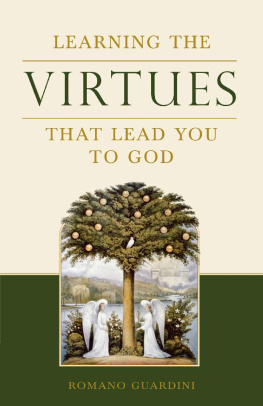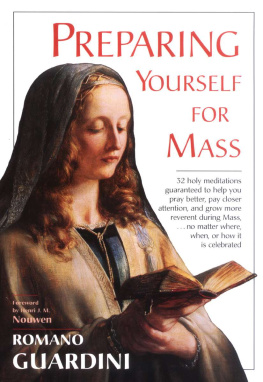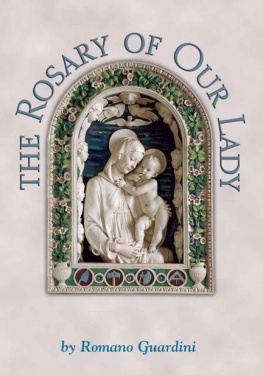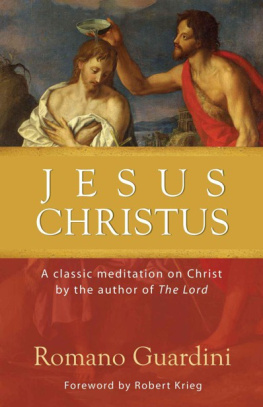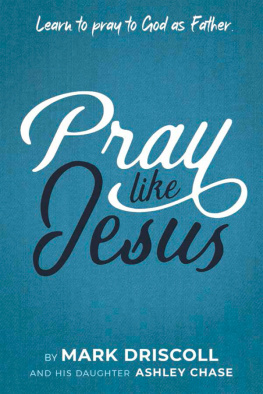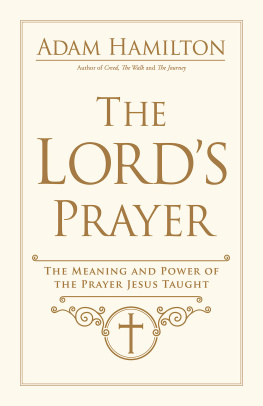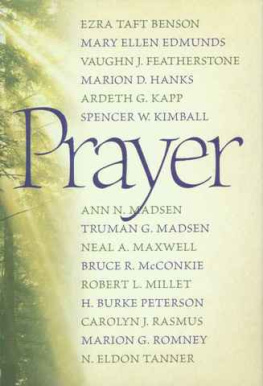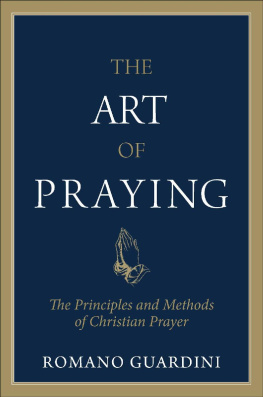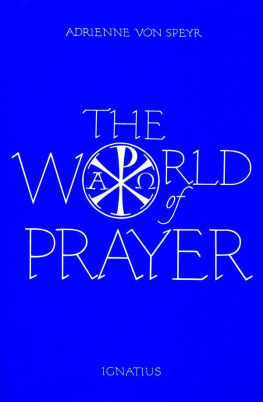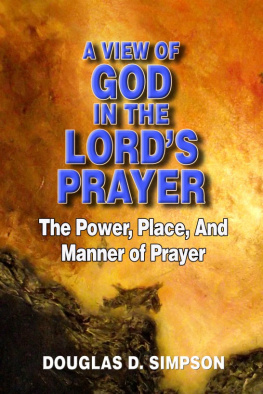This is a translation of Vorschule des Betens
(Matthias-Grnewald Verlag, Mainz)
NIHIL OBSTAT: JOANNES M. T. BARTON, S.T.D., L.S.S.
CENSOR DEPVTATVS
IMPRIMATVR: E. MORROGH BERNARD
VICARIVS GENERALIS
WESTMONASTERII: DIE XX FEBRVARII MCMLVII
COPYRIGHT 1957 BY PANTHEON BOOKS INC.
333 SIXTH AVENUE, NEW YOK 14, N. Y.
LIBRARY OF CONGRESS CATALOG CARD NUMBER: 57-10243
eISBN: 978-0-307-83329-7
v3.1
CONTENTS
CHAPTER 1
PREPARATION AND FORM
Life and Practice of Prayer
I T is often asserted that true prayer cannot be willed or ordered, but must flow spontaneously, like water from the spring, from within. If this does not happen, if it does not well up from our innermost being, one had better not pray at all, for forced prayer is untrue and unnatural.
This sounds, at first, convincing enough; however, if one has gained a fuller understanding of mans nature and religious life, one cannot wholly dismiss the suspicion that those who propound such views have never seriously concerned themselves with prayer. Undoubtedly, there is prayer which comes unprompted from within. For instance, some unexpected glad tidings may move a man to give thanks and praise to God; or, when in great distress, he may turn to Him whose love he does not doubt, and who has the power to comfort and to help. There are times also when man experiences Gods presence so vividly that he speaks to Him spontaneously. Or he suddenly becomes aware of the work of divine government behind some event and stands still, overawed. The fact that these things do happen does not mean that they must inevitably happen. Life and destiny may stand like an impenetrable wall between man and God. The feeling of the holy presence may disappear so completely that man may think he has never experienced it. Happiness may cause him never to think of God, or affliction shut off the inner vision. The dictum that sorrow teaches people to pray is only half true, for it is equally true that adversity turns people away from prayer.
Prayer which springs from inner longing must, on the whole, be considered as the exception. Anyone proposing to build his religious life on this foundation would most probably give up prayer altogether. He would be like a person trying to base his life entirely on intuition and impressions, leaving aside order, discipline and work; such a life would be at the mercy of chance; it would become self-indulgent, arbitrary, fanciful; earnestness and steadfastness would vanish. The same would happen to prayer that relied exclusively on inner spontaneity. Anyone who takes his relationship to God seriously soon sees that prayer is not merely an expression of the inner life which will prevail on its own, but is also a service to be performed in faith and obedience. Thus it must be willed and practised.
It is of this practice of prayer that we shall speak here. Above all, it consists in saying ones prayers at certain fixed hours: in the morning, before starting the tasks of the day, and in the evening before retiring. In addition everyone should do what he thinks right, what he is able to do, and what suits his routine. Perhaps grace before and after meals; the Angelus; a short collect before work, or a quiet moment in a church. An essential condition for this practice is to adopt the right attitude, both outwardly and inwardly: collectedness at the beginning, and discipline during prayer are essential, as is the right choice of words and texts, the learning of old established forms of prayer, such as contemplation, the Rosary and others.
No hard-and-fast rules can be laid down for this; we shall discuss it more fully later. But whatever routine one may adopt, one should carry it out honestly and conscientiously. In matters of prayer we are only too apt to deceive ourselves because, generally speaking, man does not enjoy praying. He easily experiences boredom, embarrassment, unwillingness, or even hostility. Everything else appears to him more attractive and more important. He persuades himself that he has not got the time, that there are other more urgent things to do, but no sooner has he given up prayer than he applies himself to the most trivial tasks. We should stop lying to God. Better say openly, I do not wish to pray, than to make such excuses. Better not to resort to specious justifications such as, for instance, tiredness, but to declare, I do not feel like praying. This may sound less decorous, but at least it is the truth which leaves the way open, whereas self-deception does not.
But it is as well that we should remind ourselves that this is an important and serious matter. We should not be self-indulgent; we should do what duty and necessity require of us, and if it prove hard we should not hesitate to be a little stern with ourselves. Without prayer, faith becomes weak and the religious life atrophies. One cannot, in the long run, remain a Christian without praying, as one cannot live without breathing. But is this really so? Is prayer really necessary? Or is it only for inactive, impractical, somewhat weakly people who do not properly fit into life? Might one not even say on the basis of certain observations that there is something unnatural and musty about the world of praying people; something which repels the feeling of the vigorous and life-affirming? We shall examine later whether there is any truth in this assertion. Here we are merely discussing the fundamental question whether prayer is a compelling necessity for the conduct of a true Christian life. We may go further and ask whether it is not also a necessity from the point of view of ordinary health and well-being. There have been many noteworthy pronouncements to the effect that man runs a serious risk if his life is completely devoid of any activity which corresponds or is akin to prayer. Medical authorities point out that people whose attitude is exclusively extrovert, who are carried from one sensation to another, whose thoughts, conversation, work, struggles and desires are mainly directed towards external goals, soon reach a state of exhaustion and confusion. To prevent this, life must flow in two directions. It must renew itself from the inner roots, there to gather new strength and resilience. Modern man is in danger of losing his innermost centre which gives stability to his personality and direction to his way of life. Behind the faade of talk and ceaseless activities he becomes unsure of himself; beneath his self-assured persona there is an ever-increasing anxiety. To counteract this trend he must rediscover the point of inner support from which he can issue forth into the world and to which he may return again and again.
To regain inner stability it is not sufficient to spend weekends and holidays in the country. A holiday by the sea or in the mountains, no doubt, affords a measure of physical and mental recreation, but it is not true compensation and its effects are soon spent. What is required is a real counterbalance which is always effective. This cannot be found in purely intellectual pursuits. Poetry, music and the arts are in themselves not sufficient; nor is philosophy or any other mental activity. Doctors know this, but to the question of what should be done they usually have no precise answer. Some of them, however, will advocate something in the nature of spiritual or religious practice, some form of contemplative exercise; in short, some form of prayer. This, however, is difficult where faith lacks conviction, for prayer helps only if it is practised, not merely for the sake of its possible effects but for the sake of the inner relationship to God. It is important that those who believe in this relationship, or who are aware of it, should constantly renew it.


